Fix: Google Chrome Using Too Much Memory
Google Chrome is undoubtedly one of the best browsers around with its easy to use interface and fast loading speeds. The browser was first released in 2008 for Windows and later ported to other operating systems. In some cases, the browser was reported to be using a lot of memory. This problem persists regardless of the number of Tabs open on the browser. The browser’s performance becomes sluggish due to this issue and certain delays can be seen while loading the results.

What Causes the Memory Usage Spike in Google Chrome?
After receiving a lot of reports from users about the issue we investigated the matter and devised a list of solutions by following which this issue can be solved. Also, we looked into the cause of the problem and came up with a list of culprits which were triggering the issue.
- Extensions: If you are using any extensions on the browser it is possible that they might be increasing the memory draw for the browser because all extensions require additional resources to function. Also, sometimes when you visit certain sites malicious extensions are downloaded and automatically installed on the browser if there is no firewall/antivirus functioning on the computer.
- Disabled Hardware Acceleration: There is often certain flash content available on almost every website. Mostly, there are advertisements on these flash content and they load alongside the website. This can serve as a load on the computer’s processor and on the memory. But the hardware acceleration feature redirects this load to the dedicated graphics card installed on your computer and therefore, reduces the load on the processor and the memory.
- Excessive Tabs: If there are a lot of tabs opened on the system and on each tab a different website is loaded it can increase the memory tab because even if the tabs are minimized or the browser is minimized these websites are still being refreshed and stay loaded inside the random access memory.
- Outdated Application: In every update to the google chrome application the developers provide several bug fixes and increase the stability of the software. This provides a smoother experience to the users therefore, it is recommended to check if the application is updated to the latest version.
Now that you have a basic understanding of the nature of the issue we will move on towards the solutions. Make sure to follow the order in which these solutions are listed in order to avoid any conflicts.
Note: Before proceeding with the solutions, try to close some of your tabs and see if the usage gets better.
Solution 1: Disabling Extensions
If you are using any extensions on the browser it is possible that they might be increasing the memory draw for the browser because all extensions require additional resources to function. Therefore, in this step, we will be disabling the extensions in order to make sure that they are not causing the massive memory draw. For that:
- Make sure to completely restart your browser.
- Click on the menu button on the top right corner and select the “Settings” option.
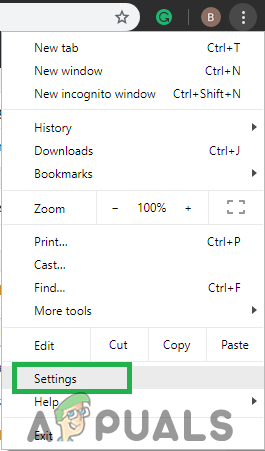
Clicking on the “Menu” button and opening settings. - Inside the settings option, click on the “Menu” option on the top left corner.

Clicking on the “Menu” button inside settings. - Scroll down to the bottom of the list and click on “Extensions” option.
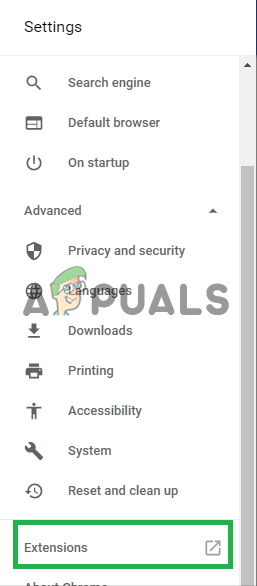
Clicking on “Extensions” after scrolling down. - This will open the list of extensions in a new tab, now make sure to disable all of them by clicking on the “Disable” button.

Click on these buttons in order to disable the extensions. - Restart the browser and check to see if the problem persists.
Solution 2: Enabling Hardware Acceleration
The hardware acceleration feature redirects the load to the dedicated graphics card installed on your computer and therefore, reduces the load on the processor and the memory. Therefore, in this step, we are going to turn on the “Hardware Acceleration” feature of the browser. For that:
- Click on the “Menu” button on the top right of the window.

Clicking on the Menu button. - Select the “Settings” option from the list.

Clicking on the “Menu” button and opening settings. - Scroll down and click on the “Advanced” option.
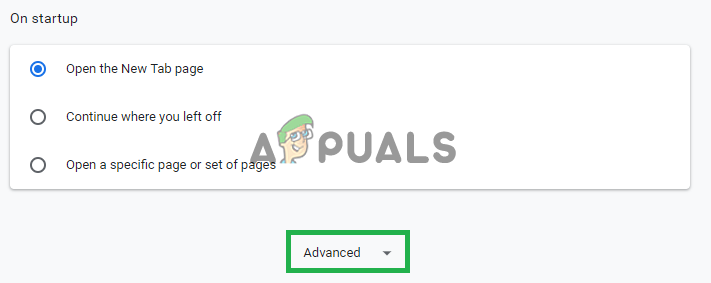
Opening Advanced Settings. - This will open up the advanced settings, now scroll down to the “System” heading.
- Make sure that the “Hardware Acceleration” option is enabled.

Enabling the “Hardware Acceleration”. - Now restart the application and check to see if the problem persists.
Note: The hardware acceleration feature is only useful if there is a dedicated graphics card installed on the browser if there is no dedicated graphics card it is recommended to keep the feature disabled in order to avoid conflicts.
Solution 3: Updating Google Chrome
In every update to the google chrome application, the developers provide several bug fixes and increase the stability of the software. This provides a smoother experience to the users therefore, it is recommended to check if the application is updated to the latest version. In this step we are going to be checking for updates to the software for that:
- Open the google chrome application and navigate to the home page.
- Write “chrome://help” in the address bar and press enter.

Typing “chrome://help” in the address bar - Chrome will now automatically check for updates and begin to download updates if available.
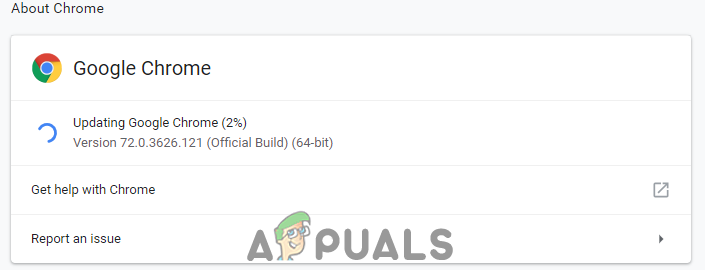
Chrome is downloading the updates. - Once the update is downloaded it will prompt you to restart the browser in order to apply it, click on the “Relaunch” option.
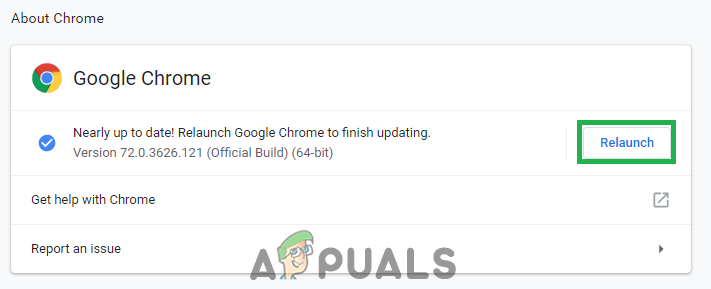
Clicking on the “Relaunch” option. - Now the Chrome application will automatically be updated and restarted, check to see if the issue persists.





